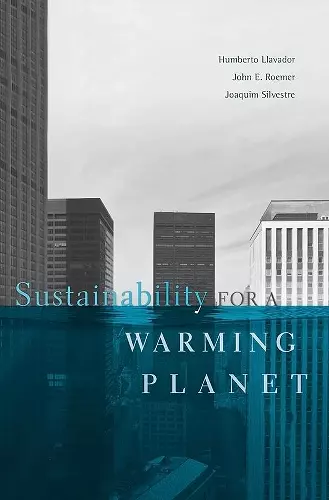Sustainability for a Warming Planet
John E Roemer author Joaquim Silvestre author Humberto Llavador author
Format:Hardback
Publisher:Harvard University Press
Published:25th Jun '15
Should be back in stock very soon

Human-generated greenhouse gas emissions imperil a global resource: a biosphere capable of supporting life as we know it. What is the fair way to share this scarce resource across present and future generations, and across regions of the world? This study offers a new perspective based on the guiding ethics of sustainability and egalitarianism.
Sustainability is understood as a pattern of economic activity over time that sustains a given rate of growth of human welfare indefinitely. To achieve this, the atmospheric concentration of carbon must be capped at some level not much higher than exists today, and investments in education and research should be higher than they currently are. International cooperation between developing and developed nations is also vital, because economic growth and the climate problem are intertwined.
The authors propose that the guiding principle of bargaining should be that the dates at which developing countries’ living standards catch up with those of developed countries should not be altered by the agreement. They conclude that developed economies would have to agree not to exceed 1 percent growth in per capita GDP annually, while developing nations should grow at a faster rate, but still lower than current projections, until they converge. The authors acknowledge that achieving such a dramatic slowdown would carry political and economic challenges.
This book should be of great interest to economists working in the field of climate change, particularly those who would like to explore alternatives to the dominant paradigm of discounted utilitarianism. Rejecting that paradigm, the authors evaluate climate policy using sustainability criteria, requiring either that future generations have the same level of utility as earlier generations or that utility grows by at least a fixed rate. -- Larry S. Karp, University of California, Berkeley
The authors provide a normative approach to global warming that they call sustainability. It consists in finding an economic path that, while satisfying environmental and other constraints, would maintain human welfare for all future generations. They also explain why the current discounted utilitarian approach is unsatisfactory. The book has many original arguments expressed in a clear, logical structure. It should be required reading for graduate students in public economics. -- Phillipe De Donder, Toulouse School of Economics
The book is scientifically rigorous as it is based on a series of peer-reviewed publications. It is very transparent as all assumptions are made explicit and explained and it even provides the entire code for the numerical analysis. It is accessibly and carefully written as it builds up the argument from scratch and presents a simplified version of the model to build up the intuition. All this might be expected from such an accomplished team of authors. It also is, however, constructive, original and bold. -- Gregor Schwerhoff * Journal of Economics *
Sustainability for a Warming Planet is a must read for economists focusing on climate change and for any scholars interested in discussing new paths to sustainability, to limiting global warming, and to preventing its dramatic consequences for humanity. -- Mitja Stefancic * Journal of Economic Issues *
Sustainability for a Warming Planet is…an intelligent and original analysis of the economic and philosophical issues underlying the climate problem. It concludes that we can meet the world’s two-degree Celsius target while continuing to grow and meet international political constraints, which is both encouraging and an implicit call to action. -- Geoffrey Heal * Journal of Economic Literature *
ISBN: 9780674744097
Dimensions: unknown
Weight: unknown
336 pages